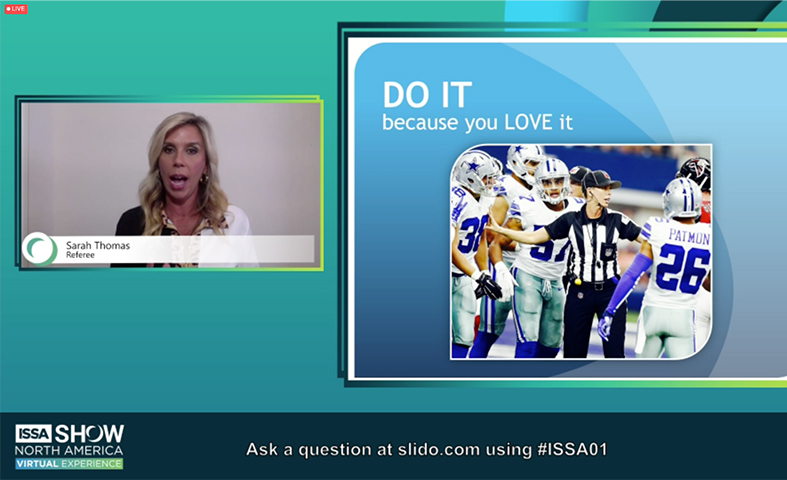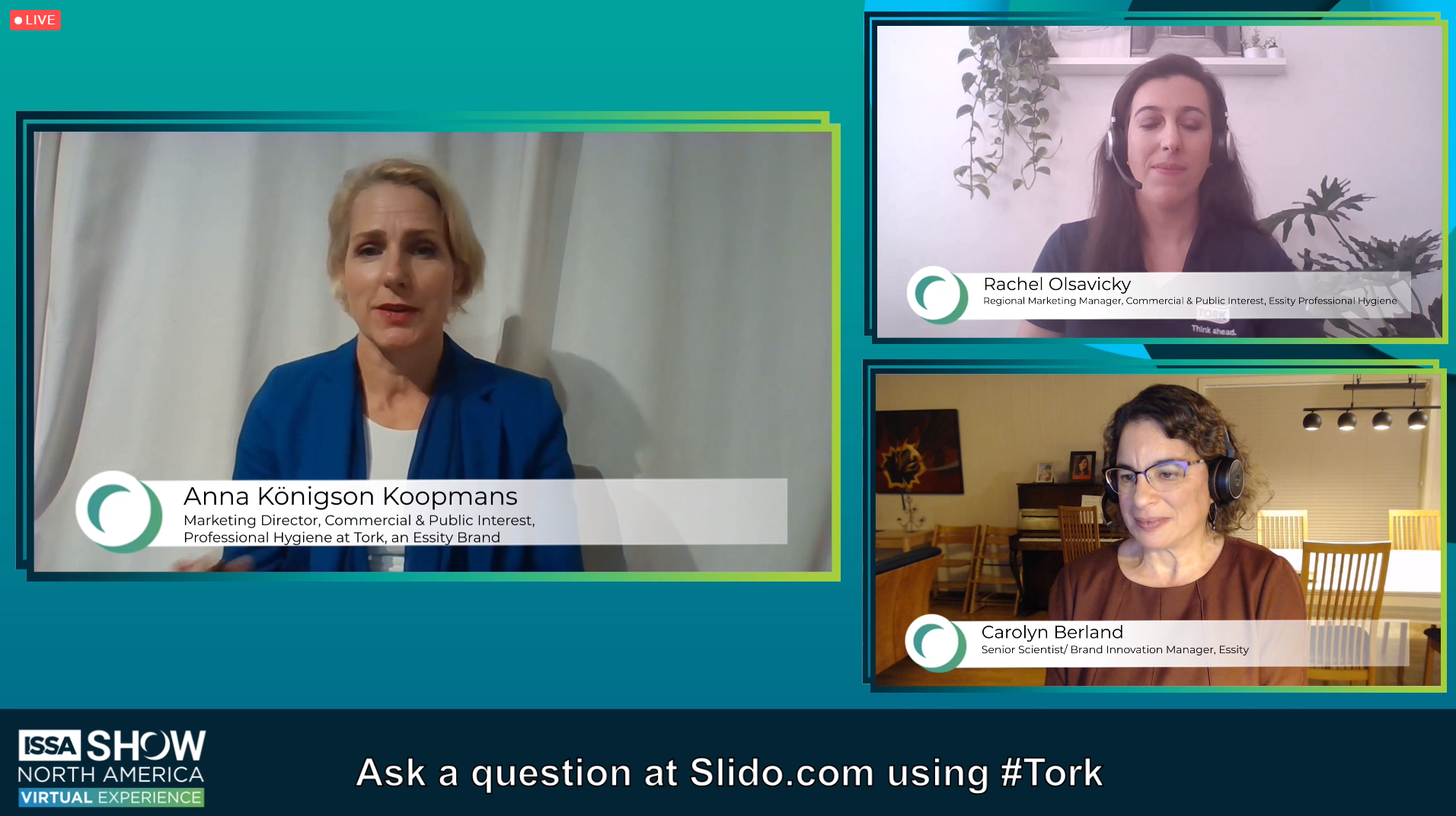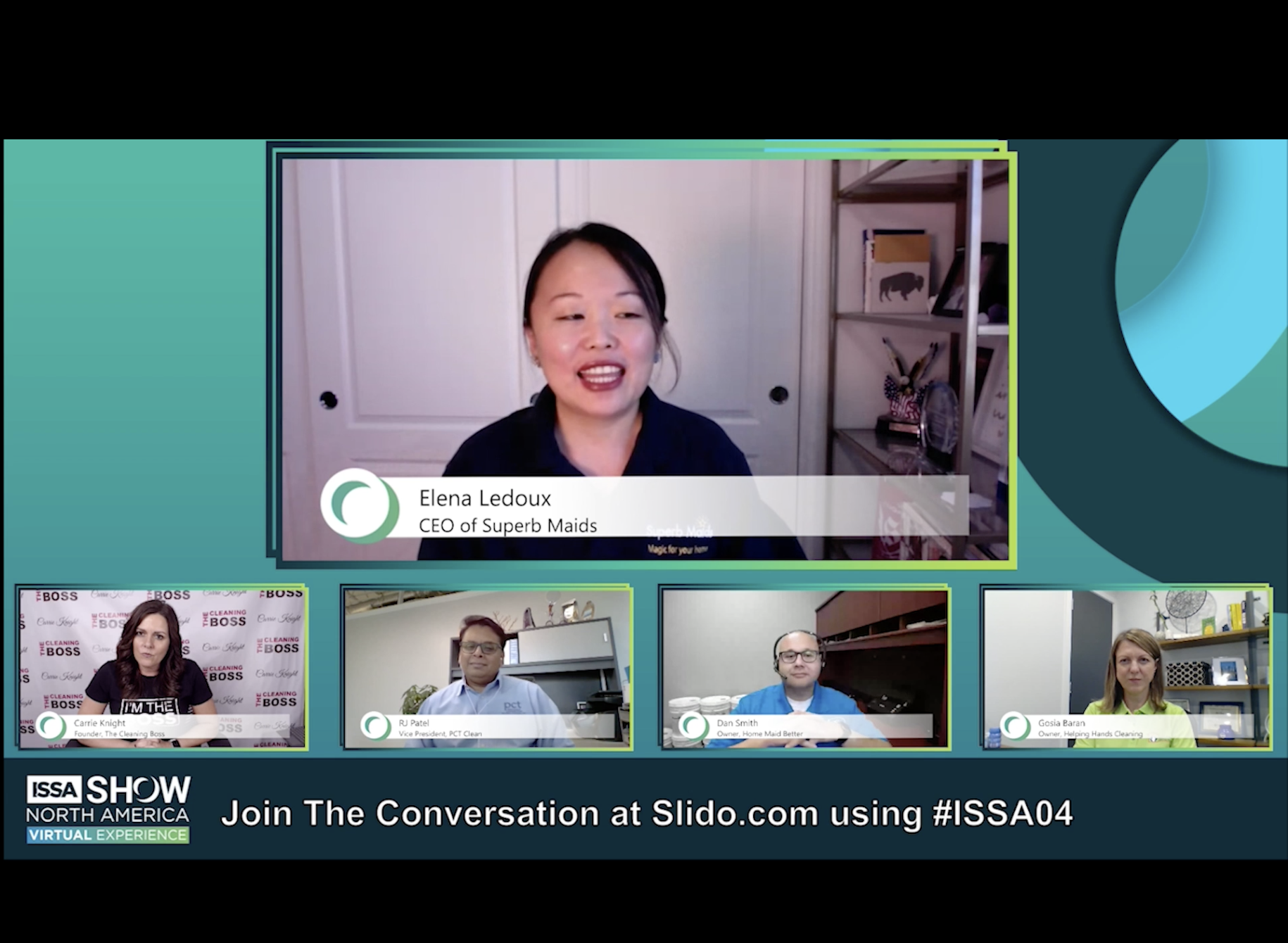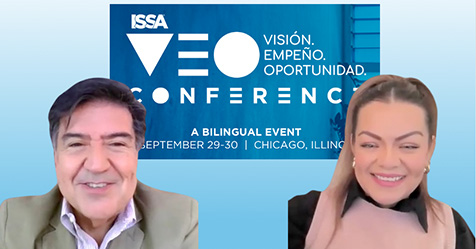ISSA Show Virtual Experience Day 2 Connects the Cleaning Industry
From hand hygiene and hospital germ zones to BSC responsibilities and bidding tactics, experts weigh in on timely topics
After Monday’s successful kickoff to the ISSA Show North America Virtual Experience, Day 2 offered more great opportunities for attendees to connect with experts, exhibitors, and each other in real time through live education, roundtable discussions, and networking events.
Here are some of the highlights from Day 2’s educational sessions.
Spotlight Speaker Offers Inspiration to Do What You Love
As the NFL’s first female official, Tuesday’s spotlight speaker Sarah Thomas shared her journey as a pioneer in a male-dominated industry, inspiring attendees to seize opportunities to succeed and never give up—even when the odds are against you.
“I learned, if you are constantly making excuses or feel sorry for yourself, then you are always looking in the rearview mirror and not at the opportunities in front of you,” Thomas told Virtual Experience attendees. “Look through your windshield and move forward. It’s so much bigger than your rearview mirror.”
Officiating her first game September 13, 2015 between the Kansas City Chiefs and Houston Texans, Thomas’ hat, whistle, and flag are now on display at the NFL Hall of Fame and serve as a testament to this historic achievement.
Learn more about Thomas’ journey and her inspiring message to attendees here.

Is Your Facility Navigating “the New Hygiene Standard”?
Since the coronavirus pandemic began, there has been an increased awareness of hand hygiene, especially at public restroom facilities where visitor perceptions have changed. Essity thought leaders helped attendees navigate the “new normal” in their facilities during Tuesday morning’s live session ‘Secure the New Hygiene Standard and Help Facilities Get Back to Business.’
So what is a “new standard of hygiene”? Anna Königson Koopmans, marketing director, commercial and public interest, at Essity, discussed results from an April 2020 survey conducted by United Minds for Tork, in which 81% of respondents said they “expect public restrooms to provide a safe hygiene environment to a higher extent now than before COVID-19.”
The new standard of hygiene signifies that facilities and “cleaners are being held to higher standards than ever before. The status quo is no longer good enough,” Carolyn Berland, Ph.D. senior scientist and global brand innovation manager at Essity, said. “Facility managers are facing increased pressure to provide a clean and safe environment and also, to make visitors and staff feel safe.”
Berland added, “distributors and facility managers have had to develop more robust cleaning protocols.” Facility managers ranked cleaning quality, employee well-being, and cleaning performance as the most successful factors in their business, according to data from Bringing the Office Customer to Life research conducted in September 2020 for Tork.
Berland said there are four questions businesses must ask themselves to adapt to the “new normal”:
- How can I keep my employees, guests, and staff safe?
- How do I want people to perceive my facility?
- How can I ensure my facility is clean, healthy, and safe?
- How can I do more cleaning with the same resources?
Businesses must improve hand hygiene to reduce infection risk for a safer work environment “by cleaning smarter instead of harder.” Berland added that businesses can do this by:
- Optimizing soap and towel dispenser placements
- Encouraging good hand hygiene by posting signage
- Installing touch-free hand towel system systems
- Disinfecting high-touch surfaces frequently.
- Upgrading restrooms with new solutions like social distancing measures, enhanced hygiene awareness onsite, and reduced risk of run-outs like soap and paper towels.
Koopmans explained how digitalization has transformed cleaning operations by using data analytics to optimize resources for increased efficiency and quality. “Meeting today and tomorrow’s challenges requires new and smarter ways of working,” Koopmans said. “89% of all dispenser checks are unnecessary,” which means that cleaners should only enter rooms when needed, Koopmans added.
This session was part of the Commercial Cleaning Track sponsored by Tork, an Essity brand. Find more sessions in this track here.
Hospital Patient Care Zones
Health care-acquired infections are a big problem in hospitals that can often be curtailed by simple procedures. Jack McGurk, president and CEO of Systems Improvement Initiatives Inc., offered a possible solution that has been studied in a California hospital in his session Impacts of the Hospital Patient Care Zones Tuesday afternoon.
Although more than 96% of environmental services (EVS) staff at the California hospital realized that how well they did their jobs affected the health of hospital patients and staff, almost half admitted they didn’t clean around the patient bed and overbed tray area. This lack of training was not due to laziness, forgetfulness, or lack of awareness about the importance of cleaning. The cleaning solution hospital officials had chosen due to its quick and efficient pathogen kill rate had a strong chlorine smell and patients had complained about the odor. So, staff either didn’t clean around patient beds, or diluted the product so much that it was no longer effective.
Hospital officials decided a change was needed to ensure high-touch areas in patient rooms were thoroughly cleaned and disinfected. Investigators marked several high-touch areas in a hospital room with invisible fluorescent markers before EVS workers went in to clean. After EVS staff finished, the investigators inspected these areas with a black light, discovering that the markers remained on about half of these surfaces, signifying they were not thoroughly cleaned. These high-touch areas included the doorknob, hand sanitizer dispenser, overbed tray, bed rails, nurse call button, and phone.
Hospital officials decided these areas needed additional cleaning and began a study using volunteers. The volunteers were given a packet of accelerated hydrogen peroxide wipes to clean these areas every day. The wipes were chosen as they were safe and ready to use with no pungent odor.
The hospital found its Hospital Consumer Assessment of Healthcare Providers and Systems (HCAHPS) scores were higher once volunteers began wiping these high-touch areas. However, the study was interrupted by the COVID-19 pandemic as volunteers were no longer allowed in the hospital.
McGurk said the study will resume when the pandemic is over. However, he feels there was enough evidence from the study to recommend that hospitals implement the use of hydrogen peroxide wipes in patient rooms by EVS staff and other workers. For instance, food service workers can use the wipes to clean overbed trays before they give patients their meals, management staff conducting rounds can wipe bedrails, and nurses can wipe down surfaces when they attend to patients.
McGurk offered another recommendation to help stop the spread of infectious diseases in hospitals. As health care workers encourage patients to walk instead of staying in their beds all day, patients are given socks with rubber grippers on the bottom. McGurk suggests hospitals give patients two pair of socks. “They can have red socks with no grippers for when they’re in bed. Red rhymes with bed,” he suggested. “And they can be given green socks with grippers for when they’re walking around. Green signifies go. This can prevent patients from bringing dirt from the floors into their beds and into the operating rooms.”
This session was part of the Healthcare track, presented by IEHA, a Division of ISSA. Find more sessions in this track here.
Growing During a Pandemic
Day two brought a lively panel discussion of the effects of the current pandemic on residential cleaning companies and how each of the panelists’ companies had responded to the situation. In How Covid-19 Created Opportunity for Many Cleaning Businesses, Carrie Knight, founder of The Cleaning Boss, hosted a panel of four industry leaders: Dan Smith, owner of Home Maid Better; Elena Ledoux, owner of Superb Maids; RJ Patel, owner of Prestigious Cleaning Company; and Gosia Baran, president of Helping Hands Maid Services.
Ledoux said, like most people, she didn’t take the outbreak seriously at first and thought it would be controlled. But she said her motto in life is to be like the buffalo: When lightning strikes, cows run away from it, but buffalo run toward it. She added, “When there is a problem, you have to run toward it and face it. I try to be a buffalo.”
Baran said her priority from the beginning was keeping her employees working. She said, “I couldn’t possibly see my business shut down because I have too many people who depend on the work. So that was my main goal. I was just trying to do anything I could to keep my employees working.”
Smith echoed Baran’s goal. He said, “It wasn’t about profitability; it wasn’t about growth; it was about protecting our team.” In April, his company launched a disinfectant giveaway in the community, which was a big hit since people could not find disinfectant products. He thought there would be small, local engagement, but 750-1,000 cars showed up.
The impact of this on his company has been impressive. He explained, “We stepped into that from a create-work-for-our-team motive—what can we do to ensure we have work for them—not about marketing, but unexpectedly, we still get calls today from people talking about it and looking to try our company for the first time.”
When the shutdown hit in Georgia, Patel says he didn’t know what to do, so he contacted his congressman, who knew him and, in theory, knew his work. Patel says, “That call, which lasted 18 minutes, was an important call because [it turned out] he didn’t know exactly what we did. He said, ‘It sounds like you guys are an essential business.’” The congressman’s next call was with the governor to discuss which business would be deemed essential, and residential cleaners were deemed essential when the governor made his announcement.
Baran says that throughout the pandemic she has worked to stay positive and stress to employees how important it was that their work is considered essential. She said, “It was important for me to give them that feeling of being needed. They wanted to come to work. They were not afraid. There was so much fear going on. I just had to trust that we would be fine. We needed to stay open.”
She also did well to act preemptively. Baran says she saw what was happening in Europe and China ahead of the virus’ sweep across the U.S. and bought up every cleaning supply she could to prepare for what was to come.
Ledux also took a proactive approach. She said she tried to figure out the disease’s worst-case scenario by talking to doctors and nurses. She started making decisions and messaging those decision to clients and employees. Ledux says as soon as her company started doing its own messaging to “counteract the fear messages” from elsewhere, cancellations stopped and business actually grew.
Communication is key, agreed Smith. He said, “Start first with communication inside your company. Control the narrative and muster up as much leadership as you can even when you are not confident in yourself. The team needs to know you are in control.”
Patel said it was important for him to not let fear control him. He put his faith in the cleaning process and education of his employees. He gave employees the opportunity to go through Global Biorisk Advisory Council (GBAC) training, which he feels makes his company “even more essential.”
The Perils of Playing the Low-Bid-Wins game
In a particularly creative and thought-provoking session, Breaking Through: Powerful Insider Insights on Winning Better Business, Gip Erskine, principal of Want What Works LLC, spent the majority of his presentation in a parable. Through the story, Erskine explained why commercial cleaning companies often hurt themselves by playing the “low-bid-wins game” in which competitors continue lowering and lowering their bids on requests for proposals (RFPs) until they are losing money.
The parable followed Bob, a commercial cleaning company owner making putting in his first RFP for a large, prestigious company. From the beginning, Bob ignored or rationalized red flags and focused on the positives that would come to his company if he got the new account—red flags like the impersonal meeting he had with the client’s representative, the RFP guideline’s requirement that he list his profit margins; and the way he felt like he was “selling his soul.”
Bob felt like the intangible aspect’s his company offered (like great customer service and commitment to go above and beyond expectations) were not of value to this large company, but he continued on with the RFP, dropping his bid so low that he would barely turn a profit because of the benefits the new client would bring. His company was named a finalist for the contract, but he was asked to submit a new, lower bid. Bob brought the bid down by 10% even though it meant he would have no profits from the account; there would also be nothing left over for quality control or ad hoc issues. But Bob’s company won the contract.
On one hand he was glad he had played the game and won. On the other, he felt he had “sold his soul” for the contract and had compromised his standards.
For the next three months, Bob threw himself into managing the account, but he did not receive any new opportunities as a result of this big client. Meanwhile, other accounts were suffering, as he felt couldn’t take his eye off his account.
Then Bob ran the numbers and found he was hemorrhaging money. He approached the client about needing to increase charges to cover issues not covered in the RFP. The property manager said it was his problem it wasn’t listed in the RFP and if he couldn’t perform at the price he quoted, they would find someone who could.
Bob reexamined his company and let go some workers, and this his founding client cut ties due after feeling neglected. He sank into depression before eventually accepting his role in his failure and committing himself to climbing back out of the hole he had made. Facing financial ruin, Bob did something brave: He fired his big client.
Bob realized going after an RFP that focused solely on price put no value on the specialness of his company. He knew he needed to find clients who valued his company for what it was—a top-tier provider with quality skills. Bob found a mentor to help guide him and bring his company back from the brink. His mentor taught him five keys to creating value in his company and avoid playing the low-bid-wins game that audience members should use too:
- Know thyself: Figure out who you are and why your company is valuable.
- Reinvigorate the vision of your service to mankind: How do you see your company making a difference and how can you reinforce that?
- Enlist the help of a guide: Seek out a trusted mentor from within the industry you serve and use their insights to help you align with the clients you want to serve.
- Tell a better story: With your renewed purpose there is nothing more evident to a prospect that you have value. They want to be part of the story.
- Enlighten your clients: Explain to clients why everyone loses in the low-bid-wins game.
Erskine says, “The perils of playing the low-bid-wins game are that all competitors are racing to the bottom, and the only way to stand out is to decline to play the game.”
BSCs Play New Role During Pandemic
In addition to keeping their customer’s facilities safe and clean, Building Service Providers (BSCs) have been valuable sources of information for their clients during the pandemic. A panel of cleaning experts shared insights on how BSCs can best serve their clientele during a session titled Key Solutions Every Building Service Contractor Should Consider earlier this week at ISSA Show North America Virtual Experience.
Panelists started the discussion reflecting on the new status of cleaners employed by BSCs. “Pre-COVID-19 there was a perception BSC staff were just janitors emptying the garbage,” said Michael Conrad, president of National Service Alliance (NSA). “Today they are looked at in a whole new light as professionals who are providing education.”
“BSCs have seen a complete change in their roles,” said Chuck Stovall Jr., global sales director, BSC/Property Management at GOJO Industries. He believes that BSCs who have been successful during the pandemic have been those who thought outside the box and came up with solutions for problems such as lack of personal protective equipment (PPE).
Stovall referenced a McKinsey report that found although 90% of Americans want to go back to their workplaces, 72% only want to do so if they feel the environment is clean and safe. He said BSCs have an important role to play in helping employees feel safe again in their workplaces.
Employee confidence would be high if the first thing they saw when they walked into their workplace each day were posted metrics stating the last time the facility was cleaned, specific cleaning protocols followed, and proof of improved air filtration, according to Chris Wetmore, vice president of sales at ICE Robotics.
Stovall and Bill Cates, National Accounts Team Leader at Kimberly-Clark, both pointed to Internet of Things (IoT) technology as a solution for gathering data with the focus of using it to instill confidence. “Data is important for showing that facilities are tracking foot traffic for social distancing and measuring cleaning,” Cates said.
“As a BSC you need to understand your role in knowing where IoT is going and bringing this solution to your client,” Stovall said. He also said automatic components of IoT make people feel like they are avoiding contamination. “People don’t want to touch buttons anywhere anymore,” he said.
Conrad stressed this touch-free environment is especially needed in restrooms. “How do you stop the spread of germs? Develop a hands-free environment,” he said. “Who wants to go into a restroom and touch anything today? BSCs want to recommend to their clients a true hands-free environment.”
This session was part of the Commercial Cleaning track, sponsored by Essity, a Tork brand. Find more sessions in this track here.
ISSA Show North America Virtual Experience Continues
Registration is still available for the ISSA Show North America Virtual Experience, and educational sessions will be available on demand through March 2021. Log into your Virtual Planner to add upcoming events to your planners, including these live sessions planned for Wednesday:
|
9:00 AM – 10:00 AM CST |
The Changing Landscape of Disinfection, Claims and Efficient Application |
|
Speaker: Amanda Bakken, Kaycee Strewler |
|
|
10:00 am – 11:00 AM CST |
|
|
Speaker: Carolyn Berland, Patty Ollinger, Gavin Macgregor-Skinner |
|
|
10:00 AM – 11:00 AM CST |
|
|
Speaker: David Drinard |
|
|
11:30 AM – 12:30 PM CST |
|
|
Speaker: Shalonda Patterson |
|
|
11:30 AM – 12:30 PM CST |
|
|
Speaker: Liz Trotter |
|
|
12:30 PM – 1:30 PM CST |
|
|
Speaker: Linda Silverman, Jennifer Rosenberg, Maria Erickson |
|
|
1:30 PM – 2:30 PM CST |
|
|
Speaker: Mark Kirchgasser |
|
|
2:30 PM – 3:30 PM CST |
Moving from Human Capital to Human Spirit During Uncertainty |
|
Speaker: Dirk Beveridge |
|
|
2:30 PM – 3:30 PM CST |
|
|
Speaker: Ron Segura |
|
|
3:30 PM – 4:00 PM CST |
|
|
Speaker: Pat Pipi |
|
|
4:00 PM – 5:00 PM CST |
|
|
Speaker: Margaret Walker-Shaw |
|
|
4:00 PM – 5:00 PM CST |
|
|
Speaker: Shawna Cragun, Tony Almeida, Mike Jones |




